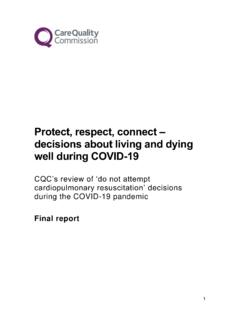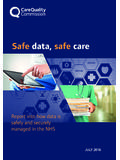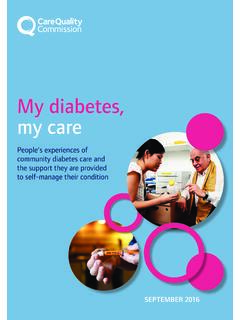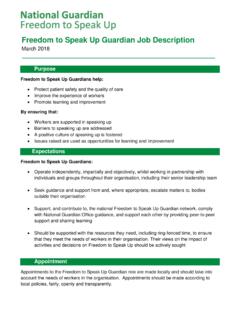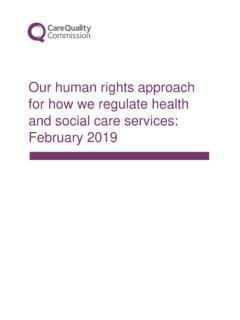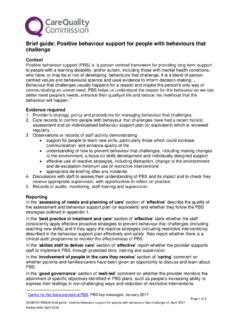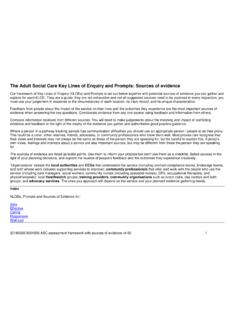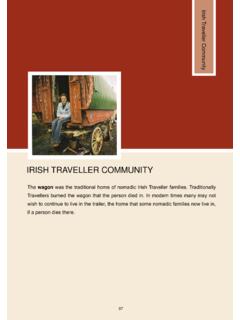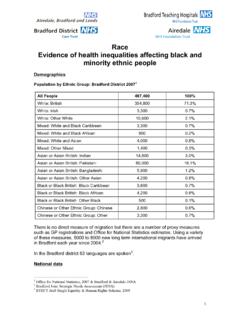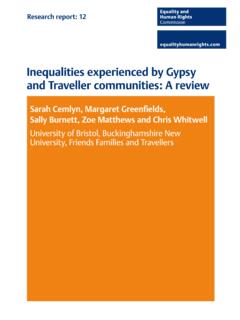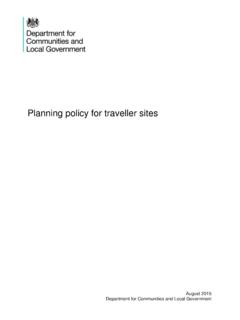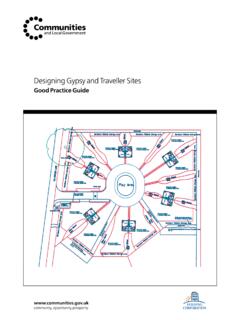Transcription of Gypsies and Travellers - Care Quality Commission
1 MAY 20161 Gypsies and TravellersWe spoke to members of several Gypsy and Travellers groups who told us about their experiences, and described the following barriers to good end of life of cultural understandingMost of the people we spoke with had experiences of being treated poorly when visiting someone at the end of life in hospital, which they felt reflected a lack of cultural understanding from services and staff. People told us that staff did not understand that the extended family of a member of their community all need to visit to pay their respects to the person who is dying, while they are still alive. This means that they have large numbers of visitors in the last days of their described the difficulty of being restricted to one visitor at a time.
2 They had also experienced conflict with staff about parking their caravans in the hospital car park, staff being aggressive, and situations where staff threatened to call, or called, the police. Several people told us that hospital staff were rude to them, and that they felt discriminated against, which had a negative impact on the person and their family. In addition, there was a failure to recognise the need for the quick release and burial of the body in traveller culture. One person told us, We couldn t bring him back, we couldn t do it how we wanted to do it and they didn t understand, they didn t think it was a big thing. In contrast, one community member shared a positive experience where the family were given a corner of the hospital car park to use for their trailers.
3 Other good experiences included an older person who was supported to die at home in her trailer, and hospices that welcomed the whole family in an extra large room. One person said about a hospice, I couldn t fault them one he had his own room with doors out to the car park [for visitors].. he had everything he needed. People felt that cultural awareness training for hospices was a good approach to improving end of life care for Gypsies and Travellers , as demonstrated by a recent project in Some of the people we spoke to had taken on the role of explaining about Gypsy and traveller culture to staff, and mediating between family and staff. Families were often emotional and angry, in part because they may have had bad experiences of healthcare throughout their life, which is compounded at the end of life and when people are bereaved.
4 People also told us about issues within the Gypsy and traveller community which made end of life particularly difficult. Illness and death are not talked about, and older people in particular are private 1 Barrett S, End of life care of Gypsies and Travellers in Suffolk, 2011 A DIFFERENT ENDING: ADDRESSING INEQUALITIES IN END OF LIFE CAREA DIFFERENT ENDING: ADDRESSING INEQUALITIES IN END OF LIFE CAREGypSIES AND TRAvELLERS2about death and dying. Unresolved bereavement is a significant and complex issue. People told us that bereavement services often do not meet the needs of Gypsies and Travellers as services do not understand bereavement in Gypsy and traveller culture, so services are not UNDERSTANDING CULTURAL NEEDSOne person explained how when their nephew was in the last days of his life in a London hospital, they felt the staff showed no understanding of why so many people wanted to visit.
5 She said that the staff had been rude despite her attempts to mediate and manage the situation. It was hard for me seeing my nephew where he was and trying to deal with these nurses that had no understanding whatsoever, even though I explained on many occasions what was happening and this is how we are. I would just like for them to be more understanding of our culture and the way we are. Race Equality Foundation interviewUnequal access to servicesGypsies and Travellers have poor access to healthcare generally, with difficulty in registering with GPs and poor access to services as a result, including health screening, home visits and access to secondary health care. In our local area fieldwork, not being registered with a GP was identified as an issue that stopped Gypsies and Travellers from receiving good end of life care, as this means that they have poor access to all healthcare services.
6 People also told us that Gypsies and Travellers tended to present very late and did not access services through a GP. We found that commissioners and services in most areas had done very little to reach out to the Gypsy and traveller community. However in two local areas, GP practices had engaged with communities and built up good relationships. In one area, we found that GP practices with traveller communities in their catchment area had a good knowledge of their patients. They told us that they had built up relationships with members of the community over the years to help encourage them to attend for health checks and disease monitoring. In doing this they could help identify when patients were nearing the end of life.
7 CQC ENCOURAGES: zCommissioners and providers to recognise the end of life care needs of Gypsies and Travellers , and to take action to understand and meet the needs of Gypsies and Travellers in their local area. zCommissioners and providers to support early identification of Gypsies and Travellers who may be approaching the end of life, as part of improved healthcare for this group. zCommissioners and providers of end of life care to ensure staff have the knowledge and skills to understand and meet the end of life care needs of Gypsies and to contact us Call us on 03000 616161 Email us at Look at our website Write to us at Care Quality Commission Citygate Gallowgate Newcastle upon TyneNE1 4PA Follow us on Twitter @CareQualityComm Please contact us if you would like this report in another language or format.
8 CQC-329-052016
